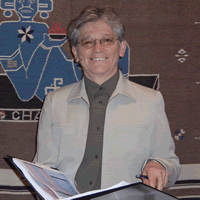|

Breaking Barriers, Embracing Culture

Barcelo has dedicated her career to promoting opportunity and diversity. |
In 1969, when Nancy “Rusty” Barcelo (MA ’72, PhD ’80) decided she was going to pursue her master’s degree in education at The University of Iowa, her uncles formed a circle around her and tried to convince her otherwise.
“The eldest said, ‘If you do this, no Mexican will marry you,’” Barcelo said. “It was unusual for a Mexican-American woman to have an undergraduate degree, let alone an advanced degree.”
Thankfully, Barcelo’s father intervened. “He took me aside and said, ‘Don’t listen to them. This is a new world. You need to do this.’ It was with that encouragement that I went forward,” Barcelo said.
But being a Chicano woman at The University of Iowa wasn’t easy. Barcelo, whose family lived in California, only knew of two other Chicano students at the University.
“It was really isolating,” she said. “It made me realize that I needed my culture in my life.”
As a child, Barcelo had attended school on military bases all around the world. She was used to diversity.
| "When I see students of color walking across that stage, it gives me such pride-because even now-that journey is not easy, ” Barcelo said. |
|
“To me it seemed natural that we should all be interacting together,” Barcelo said. “When I started going to public school it was a shock to me how little interaction there really was. There was a great disconnect.”
Barcelo’s mother tried to help her feel more at home in Iowa by sending care packages with Mexican food. But Barcelo needed to connect with a local community.
So, she and the other two Chicanos, one an undergraduate student and the other a law student, along with a Native American woman who also felt isolated in Iowa, started to meet regularly.
“We formed a little community,” Barcelo said.
The four eventually decided to meet with Vice President of Student Affairs Phil Jones (MA ‘67/PhD ‘75) and ask him to recruit more students of color. Jones brought Barcelo on staff to help with the task.
“Rusty has a great capacity for listening to people with differing points of view and finding common ground between or among them for taking action,” Jones said. “She is a reflective person who seems not to mind working with other people’s ideas and infusing her own points of view into actions for social change.”
One of the things Barcelo did in her new position was meet with minority groups at area high schools to encourage them to attend college.
Teresa Garcia (BA ’82) remembers the day Barcelo came to her high school in Fort Madison, Iowa.
“It made an impact on me that she was Chicana and that she had made the effort to meet with other Chicano students,” Garcia said. “It made college seem like more of a possibility than it had before.”
After Barcelo earned her master’s degree, she took a position with the Office of Special Support Services for minority students and earned a doctorate in higher education administration.
After graduation, she became an assistant dean in the Office of Academic Affairs. While in that position, Barcelo helped develop Opportunity at Iowa, a program that recruited and supported students of color at The University of Iowa. She served as associate director and then acting director of that program.
The University’s first Affirmative Action director, and former College of Education Associate Dean, Dr. Cecelia (Cece) H. Foxley said the early years were not easy, as some faculty and administrators were initially resistant to change. She relied a great deal on people like Barcelo and Jones to help the Affirmative Action/Equal Opportunity Program be successful.
“Rusty was a positive role model for women of color—for students as well as for faculty and administrators,” said Foxley, commissioner emerita for the Utah System of Higher Education, now a regents professor at the University of Utah. “I remember her untiring efforts to recruit minority students and to help faculty and staff appreciate the need for diversity in an institution of higher education. Of course, we were all supported by a stellar President, Sandy Boyd, who set the tone for the entire University and enabled our efforts to succeed.”
In 1996, after 27 years in Iowa, Barcelo left the University to accept a position at the University of Minnesota. Currently, she’s serving as vice president of Minority Affairs at the University of Washington in Seattle.
She said the proudest moment in her career happens every year at graduation.
“When I see students of color walking across that stage, it gives me such pride—because even now—that journey is not easy,” Barcelo said.
Another proud moment came in 2003, when Garcia asked her to share in a keynote address at The University of Iowa’s conference on “Strengthening and Valuing Latino/a Communities in Iowa.”
“To know [Garcia] as a high school student and then watch her go through the graduate program, and then for her to ask me to share a podium with her when it was really her moment to shine, was really moving for me,” Barcelo said.
Garcia said she still looks up to Barcelo as a role model, just like the day she first met her as a junior in high school.
“I truly respect her. She’s meant a lot to me and many of the Chicano communities in Iowa,” Garcia said. “People turned to Rusty regularly to meet with students and families who weren’t sure if they should let their daughters attend the University. She provides tremendous leadership.”
 
|